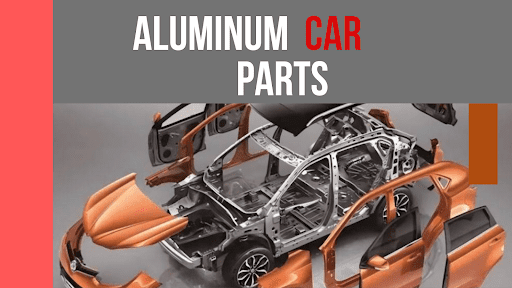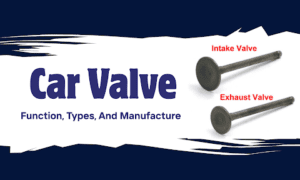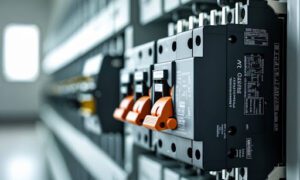Aluminum has been in the auto industry since the 20th century began. But it was not until 1961 that aluminum alloy car parts became more common as the material became more affordable. Nowadays, aluminum car parts dominate the industry, from engine components and body panels to suspension systems and cooling systems.
The benefits of aluminum car parts, ranging from a high strength-to-weight ratio to superior corrosion resistance, appeal to a wide market, which has an estimated worth of USD 90 billion as of 2024.
Manufacturers are using aluminum alloys to make car parts. This article outlines the different parts of automobiles made of aluminum, the alloys used, the aluminum parts manufacturing processes – such as CNC aluminum machining and casting – and the benefits.
Manufacturing Process For Aluminum Car Parts
Aluminum car parts can be manufactured through several methods, including CNC machining. Of course, there are the primary methods, namely forging, aluminum die casting, rolling, and extrusion. These processes combine to produce excellent parts for flawless car performance.
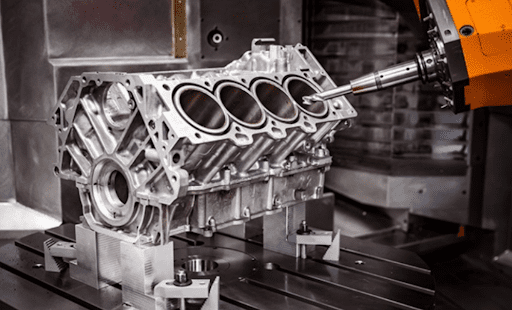
Aluminum car part CNC machining
Common Aluminum Alloys For Car Parts
Cars are a complicated collection of parts, with a single car carrying approximately 25,000 parts! Many of these parts are made from aluminum alloys, which include;
Alloy Series 1XXX
Alloys in this series are 99% aluminum, which is basically pure aluminum. A good example is 1100 aluminum, which is renowned for its superior corrosion resistance.
Alloy Series 2XXX
Alloys in this category, for instance, 2024 aluminum, have copper as the main alloying element. This component makes the alloys extremely strong to the point that they are common in even aerospace applications.
Alloy Series 3XXX
This series is primarily alloyed with manganese, has excellent corrosion resistance, and good strength. Aluminum car parts from this series are mostly in aluminum 3003, 3004, and 3105.
Alloy Series 4XXX
With silicon as the principal alloying element, aluminum car parts in this series are associated with superb heat resistance and wear resistance. They are also easy to weld. Aluminum 4032 is the most popular aluminum option for car parts in this classification.
Alloy Series 5XXX
Car parts in this series can be made from aluminum 5005, 5052, 5083, 5182, 5251, or 5754. These alloys have a good blend of strength and corrosion resistance, which is derived from the magnesium alloying element.
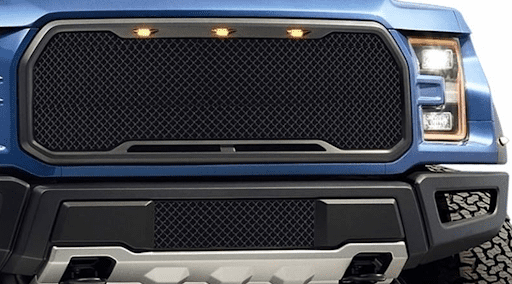
Aluminum 5005 mesh grille
Alloy Series 6XXX
This is the series to choose for aluminum car parts, offering the best malleability and strength. 6061 aluminum is the most popular in this class, but 6016 and 6181 are also worthwhile options.
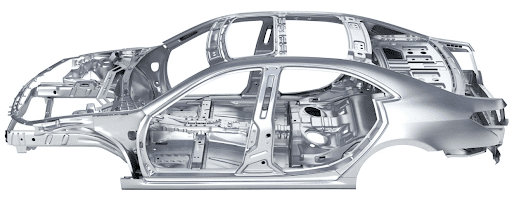
Aluminum 6061 car frame
Alloy Series 7XXX
The 7XXX is among the strongest ones available in the market. Options like aluminum 7003, aluminum 7075, and aluminum 7046 are suitable for aluminum car parts in high-stress applications.
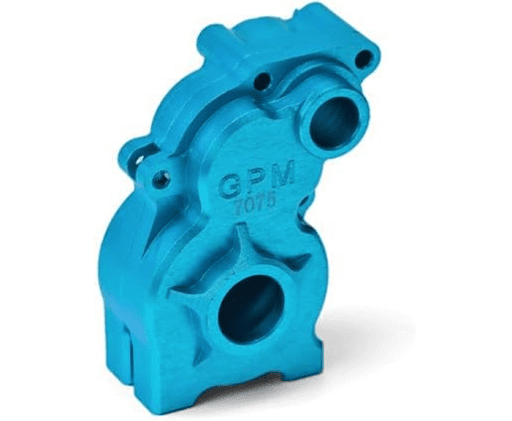
Aluminum 7075-T6 transmission housing set for off-road car
Advantages Of Aluminum Car Parts
The reasons aluminum has become so popular for Aluminum Machining Services for car parts are less weight, higher corrosion resistance, and less manufacturing complexity. These advantages translate to not only superior performance but also more affordable aluminum parts manufacturing.
1.Less Weight Affects Efficiency, Durability, And Manufacturing Costs
Cars made from aluminum parts consume less energy and last longer because of less strain on core components. With the car market drifting towards electrification, the relevance of lightweight aluminum has become even more critical for efficiency.
Less weight means aluminium in automotive is subjected to less stress, which is good for durability. Wheels are the initial areas of this effect; they last longer due to less and softer braking.
An aluminium car body is lighter and hence, easier and more affordable to manufacture because the car can use smaller parts – brakes, electric motors, and so on. For electric vehicles, smaller batteries mean less raw material for manufacturing, which promotes sustainability.
2.High Corrosion Resistance For Durability
Aluminum car parts are self-healing in the face of corrosion, often creating a protective natural barrier within milliseconds of deforming or cracking. These parts are different from steel ones, which need an artificial coat that is perpetually prone to rust.
Therefore, aluminum automotive components can potentially last significantly longer than parts made of other metals, regardless of the severity of the environment.
3.More Recyclable And Retains Properties
Aluminum is easy to recycle without losing properties, a characteristic that is not found in steel. The closed-loop recycling process ensures the metal retains its formability, lightness, and other core properties.
Therefore, less waste is created in manufacturing. With much less aluminum used in manufacturing for the same steel requirement, the energy savings are monumental.
Common Applications Of Aluminum Car Parts
Aluminum car parts are widely used, from the chassis to the interior, and from electronics to air conditioning. CNC machining, aluminum 3D printing, and many other manufacturing processes are available to provide the required aluminum parts.
Here are areas in a car where you can find these parts:
1.Chassis And Powertrain
These sections require tough and rigid parts for fatigue resistance, strength, and such characteristics. Aluminum alloys that fit these requirements include 2024, 5052, and 6082 aluminum.
Specific applications for these aluminum grades are transmission system, suspension system, steering system, aluminium car frame, and braking system, among others.
2.The Auto Body
The auto bodies should be corrosion-resistant, wear-resistant, and easy to fabricate. Many aluminum alloys serve these functions excellently, and are used to build bumpers, roof racks, door latches & hinges, and sunroof railings, among other parts.
Alloys used in such areas include aluminum 5005, 5182, 6181, and 5083.
3.The Electrical And Electronic System
Aluminum may not be as conductive as copper, but its low weight makes it a good option for this sensitive system. For wiring, 1350 can be used in sensors, ignition, cameras, radios, and gauges.
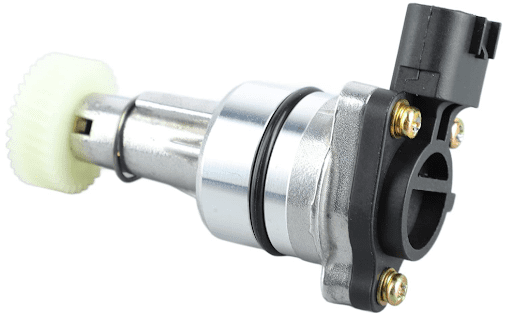
Aluminum 1350 car speedometer sensor
Conclusion
Aluminum car parts are highly regarded for their distinct properties that suit the demanding auto market. Alloys like 7075 aluminum for strength and 6061 aluminum for fatigue resistance have been the mainstay of the industry.
ProleanTech is a reliable partner in aluminum car parts manufacturing, with prowess in the best CNC machining and related services.
Contact the team today for more details.

